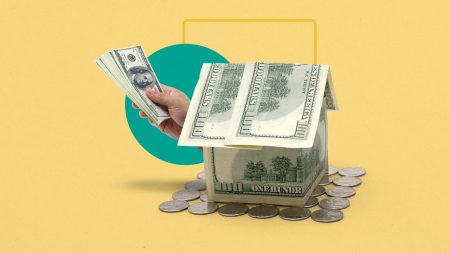How old were you the first time you thought to yourself, “I’m rich!”
Maybe it was after receiving your first allowance or a birthday card from Grandma. It probably wasn’t much money, but it suddenly seemed like anything was possible.
When was the last time you felt that way?
As we grow older, our perception of wealth evolves to reflect life’s demands and the shifting financial landscape around us. Rising expenses and increasing financial pressures naturally change how you think about your finances.
A recent survey from Jenius Bank about money’s impact on mental health revealed a nuanced truth: being rich is less about the figures in our bank accounts and more about our emotional well-being.
There’s no specific dollar amount that guarantees a rich life, but that doesn’t mean you can’t “live richly.”
How do people define being rich?
According to the Jenius Bank’s Mind-Money Connection survey, many Americans define richness in practical, grounded terms.
The top definition, chosen by 33.4 percent of respondents, is simply not having financial debt. Financial freedom from debt — whether it’s student loans, credit cards or mortgages — seems to represent the first step toward feeling rich.
Closely following that, 33.1 percent of respondents define being rich as retiring early without the fear of running out of money. It’s not just about the ability to accumulate wealth, but ensuring it lasts long enough to live comfortably through retirement.
Establishing generational wealth, mentioned by 27.8 percent surveyed, is another key definition. For many individuals, richness means securing a financial legacy that benefits future generations.
Even higher incomes might not mean rich
Despite these definitions, many people still don’t see themselves as rich — even when they have higher incomes. Only 20.4 percent of the general population considers themselves rich, yet 32.3 percent believe others view them that way. This gap suggests that perceptions of wealth are often subjective and influenced by personal expectations, lifestyle or even societal pressures.
This sentiment is evident even among higher earners. Among those making over $300K annually, 45.9 percent still say they don’t see themselves as rich, despite what the numbers might suggest.
Clearly, the feeling of richness isn’t just tied to income; it’s about how people perceive their financial situation compared to their needs and goals.
Differences between men and women in feeling rich
The survey also reveals a stark contrast between men and women when it comes to feeling rich.
A staggering 84.4 percent of women do not consider themselves wealthy, compared to 66.2 percent of men. Even more telling is that 47 percent of women feel they are financially behind where they thought they would be, compared to only 32.4 percent of men.
The difference in perception persists even when their salaries are similar, suggesting that factors beyond income — such as societal expectations or financial confidence — may contribute to these feelings.
This indicates that the gender pay gap may not be the only reason women are less likely to feel rich. Instead, emotional and psychological factors likely play a significant role in shaping their perceptions of wealth.
How do perceptions of richness affect individuals?
The way people perceive their wealth influences their feelings about finances and may significantly impact mental and emotional well-being.
According to the Jenius Bank survey, 39.8 percent of respondents feel their financial standing is below where they expected it to be at this point in their lives. This gap between expectation and reality can lead to frustration, self-doubt and diminished confidence.
When individuals feel they’ve fallen short of financial goals, it often compounds existing worries about money, creating a cycle of stress and anxiety. This emotional burden often accompanies financial strain, affecting how they manage money and approach future goals. It’s not just about the dollars in their accounts — it’s about the emotional toll that unmet expectations take.
Financial pressure and mental stress may influence spending habits, long-term planning and career decisions. Those who feel financially behind may struggle with feelings of failure, impacting their motivation to take positive steps toward improvement. Over time, this could erode both financial wellness and mental health, creating a feedback loop that’s difficult to break.
What steps can you take to live richly even if you aren’t rich?
Living richly doesn’t require a massive fortune. In fact, making smart decisions for your mental, financial and emotional well-being may help you live a fulfilling life without needing to meet anyone’s definition of “rich.”
By focusing on manageable steps and setting realistic goals, you can help feel in control of your financial situation and enjoy a sense of richness in your everyday life.
Avoid comparisons
One of the biggest barriers to feeling financially satisfied is comparing yourself to others. Whether it’s a friend’s new house or a neighbor’s luxurious vacation, measuring your success against someone else’s achievements makes it harder to appreciate where you are.
These comparisons could lead to frustration and poor financial choices, as you may feel pressure to spend or save in ways that don’t align with your own priorities or circumstances. Focusing on your personal goals, rather than comparing yourself to others is key to helping feel rich in your own life.
Schedule face time with your finances
Even if you don’t consider yourself a financial expert, tracking your spending can help you identify a plan for unlocking a richer life. Whether it’s paying off a credit card, saving for a down payment on a home or hitting a retirement savings target, these achievements help build financial confidence.
By celebrating each milestone you reach, you may experience a sense of progress that fuels your motivation, even if you’re not “rich” by traditional standards.
Address debt strategically
Debt may make it difficult to feel financially free or live richly. Carrying debt often leads to stress and limits your financial flexibility, making it harder to focus on other goals. By taking steps to become debt-free, you can help reduce financial strain and unlock more opportunities to live richly.
Start by creating a plan to pay off high-interest debts first and work toward reducing your overall debt load. While becoming debt-free may take time, it’s one of the most important steps toward financial independence.
Make saving routine
Building up your savings is another key step to living richly, even if you’re not rich yet. Having an emergency fund helps provides peace of mind, ensuring you’re prepared for life’s unexpected expenses.
According to Bankrate’s 2024 Annual Emergency Savings Report, having at least three to six months’ worth of expenses saved is a good rule of thumb.
Jenius Bank’s savings accounts offer a helpful option for those looking to build their financial cushion while earning interest. By regularly contributing to your savings, you could create a sense of security that helps you feel more in control of your finances.
Invest in your future
Living richly isn’t just about the present; it’s also about investing in the future you want. This could mean financial investments like contributing to tax-advantaged accounts such as 401ks or IRAs, or taking steps to protect your financial security through insurance. But it can also include non-financial investments, such as furthering your education or purchasing a home.
Making smart, long-term investments in both your financial and personal life can help provide a foundation for greater wealth, stability and freedom down the road.
The bottom line
Being rich isn’t defined by a single number in your bank account.
As Jenius Bank’s Mind-Money Connection survey shows, most people have a personal definition of richness. Financial satisfaction is closely tied to emotional well-being and personal perception. Living richly is about more than just financial success. It’s about making smart decisions that align with your values, setting meaningful goals and feeling a sense of control over your future.
Whether you’re working to pay off debt, build an emergency fund or invest in long-term security, seek out trusted financial institutions and advisors who understand your goals and can help you achieve them. A good financial partner goes beyond offering products — they aim to understand your unique needs and challenges. Jenius Bank’s survey is a perfect example of this. By exploring the relationship between money and mental well-being, Jenius Bank demonstrates their commitment to addressing more than just business profits.
Look for institutions and partners who focus on what matters most and make decisions that support your financial, mental and emotional wellness. This will help you reclaim that childlike sense of possibility and live richly.
Jenius Bankᵀᴹ is a division of SMBC MANUBANK. Member FDIC.
Read the full article here












